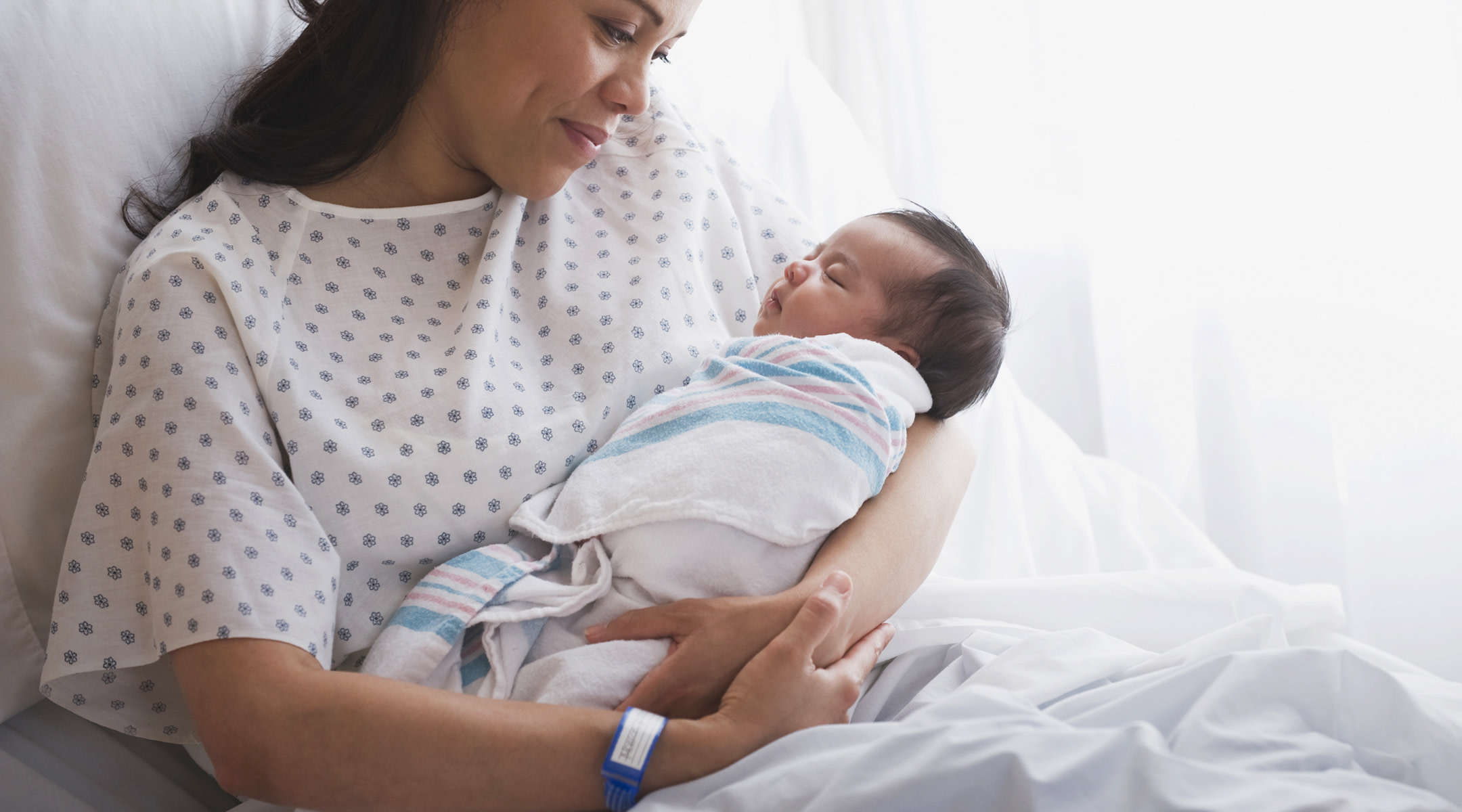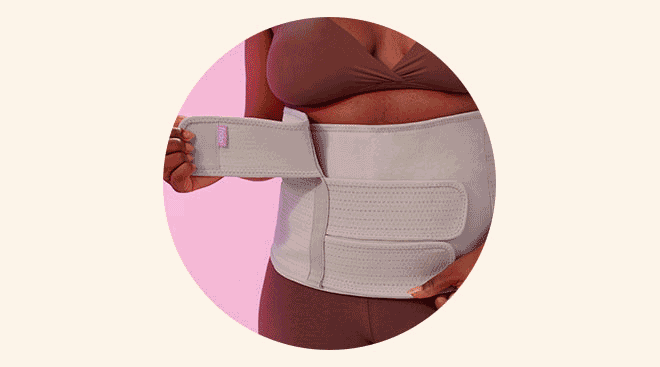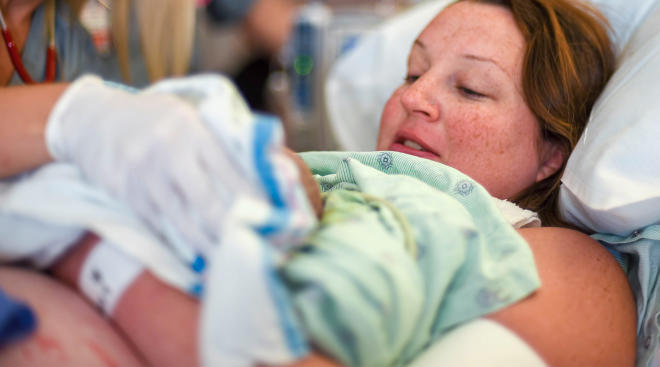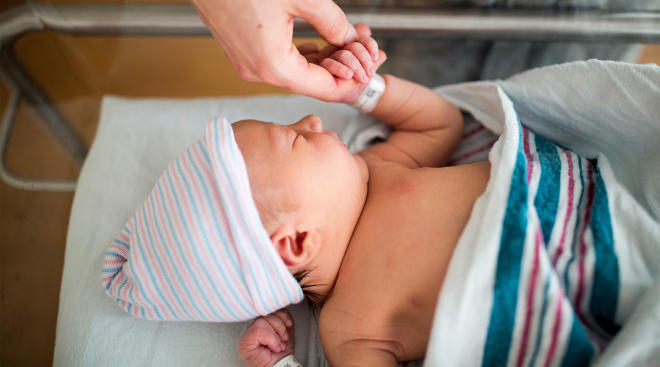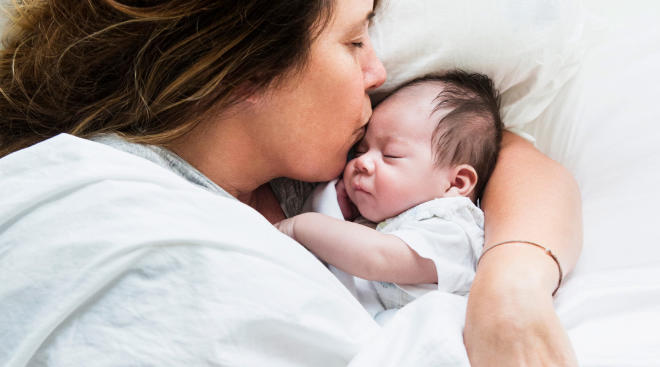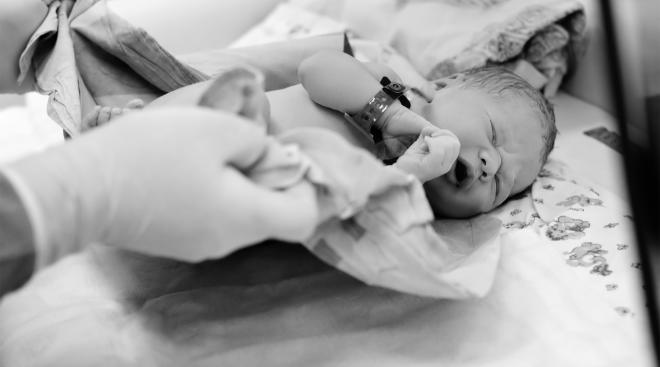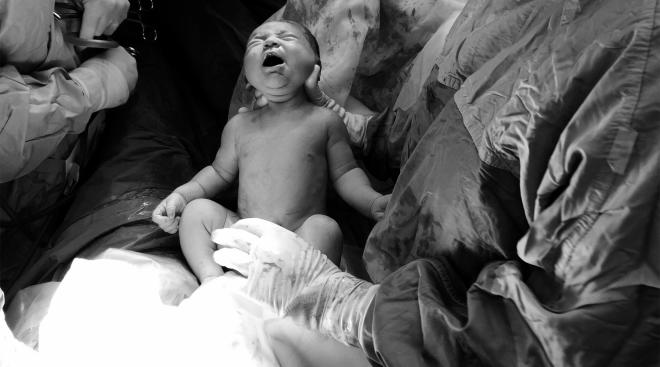What No One Tells You About C-Section Guilt
1. You feel shocked by the turn of events.
“I just assumed everything would go well because I’m a very healthy person — I thought I’d deliver like a workhorse,” says Bumpie EmmaD312, of giving birth to her son, Augustus. But after a 26-hour labor, it was clear that Amalie wasn’t progressing, so she was given Pitocin and things intensified. “My contractions became very strong and before I knew it, the baby’s heartbeat was dropping. When my doctors told me a c-section would be the best route to take, I was shocked—things did not go at all as I had expected. Later, I discovered that half of my friends had similar experiences.”
What to do: Go into childbirth with the attitude that everything will turn out fine, no matter how it goes. After all, the idea that you should be “prepared for the worst” is no way to psyche yourself up for having a baby. “I don’t want women to fear c-sections, or get into their minds that only delivering vaginally is normal,” says Kara Driscoll, MD, a psychiatrist at Prentice Women’s Hospital in Chicago, Illinois. But it’s also not a bad idea to manage expectations a bit, and to be aware of the circumstances that lead to a c-section. Talk to your doctor about what will happen in the delivery room to feel more ready, and remember that when it comes to delivering babies, you can’t ever predict exactly what will happen.
If you do experience the shock of an unexpected c-section, it’s important to remember that you are not alone. Join a new moms’ support group or community and talk it out with other women who’ve been through something similar. “When your delivery doesn’t go as planned, you need to know you’re not alone. Sharing your story with a trusted friend or a new mom’s group will help put perspective on the experience,” says Driscoll.
Another tip: “Write down your birth story. Write it or share it as many times as you have to, before you can do so without tears,” suggests Amanda Alford, a holistic health counselor who has had both a c-section and a VBAC.
When your feelings have normalized a bit, remind yourself of all the nurturing things you did while you were pregnant and the positive things you’re doing now—and will continue to do—for your baby. “Having a child is a nine-month experience; parenthood is the rest of your life,” says Driscoll.
2. You feel sad (and worried) about missed bonding time.
“I feel like I missed out because my husband wasn’t allowed in the OR, I didn’t get to hold the baby, and we didn’t get the brand new baby pictures,” says Bumpie SandFHasse.
When you get pregnant, you imagine a series of Instagram-worthy moments, and one of the biggies is having the doctor (or your partner) hand you a baby to cradle in your arms, moments after delivery. But of course, it’s not about the photo—it’s about the moment of meeting and connecting with your new child. One of the biggest disappointments for moms who have had c-sections (particularly those who had to wake from general anesthesia before meeting their babies) is not getting to have that immediate skin-to-skin contact or the chance to initiate breastfeeding.
What to do: Focus on the bonding opportunities you will have with your baby now that the delivery is behind you. “When you have been through an emergency c-section, there is both a loss of control and a loss of immediate bonding,” says Driscoll. “But it doesn’t all boil down to one moment—these moments can be reclaimed.” When you finally have one-on-one time with baby, you will have plenty of opportunities for skin-to-skin contact. And even if there is a delay in the initiation of breastfeeding, you can catch up.
“Even if you’re feeling distant from your baby, remember, this is not necessarily only because of the c-section," adds Driscoll. “It’s normal for new moms to feel this way, no matter the type of delivery.”
3. You keep re-playing everything in your mind; you feel like a failure and can’t get a handle on what went wrong.
“Now that time has gone by, I can’t help but feel a little guilty that I didn’t try a little longer to push!” says Alexpierce88. Talk about mom guilt! Your baby isn’t even a week old and you already feel like a bad mom. Feelings of inadequacy are, unfortunately, part and parcel of this whole parenting gig, but the sting can be that much harder when you feel like your first big performance—bringing your child into the world—was already a flop. This is a normal feeling. But remember: Medical circumstances surrounding your delivery required the c-section; you did nothing wrong.
What to do: Schedule a one-on-one with your OB. “Some level of going back through the experience is normal,” says Driscoll. “Some women find it helpful to schedule a postpartum consultation with their doctor to make sense of what happened. This should not be a sit-on-the-exam-table-in-a-gown kind of thing—it should be in a comfortable setting, and it would be reasonable to bring your partner or a friend.” If you’re thinking about having a second child, this appointment is a good time to ask your doctor about how your c-section could affect future deliveries. Getting more information can help you feel empowered to take control over your next delivery, whether you decide to have another c-section or go for a VBAC (vaginal birth after cesarean), which may be possible for about 72 to 76 percent of moms who’ve had a c-section.
4. You feel bad about feeling bad, since you’re fine and so is your baby.
“I was very upset about my c-section. I even cried several times in the six weeks after my twins were born—like, bawled my eyes out, sobbing,” says eandk18. This is not an unusual scene for someone who has just had major surgery and has a new baby (or babies) to take care of.
One of the most common refrains repeated to a woman after she’s had a c-section is, “At least you and the baby are healthy!” but you can’t help but feel distressed. As Roanna Rosewood wrote in her memoir Cut, Stapled, & Mended (a good read if you’re struggling with your c-section and considering a VBAC), “Why then, so long after my body has healed, do I still feel broken?”
What to do: Quit pretending you’re okay, and ask for help—and yes, it might be from a professional. “There’s this notion that if your baby is healthy you shouldn’t be upset, so new mothers feel pressure to be happy, even when they are still feeling scared and traumatized,” says Driscoll. “Don’t be afraid so share your feelings with those who are close to you.” She adds that if you’re the type of person who can’t stand to be a burden, seek out an unbiased pro, such as a therapist or postpartum doula, who may be able to better understand what you’re going through. Whatever you do, don’t keep it pent up inside. “I always remind women: You are recovering from surgery,” she says. “Ask for help. Get some sleep. Get some space between you and your worry—even if it means a watching a movie or taking a simple trip to the mailbox.”
5. You feel may feel torn about a VBAC.
“After my first c-section, I told my doctor that I wanted to have a VBAC. But when she later suggested putting me on the schedule for a c-section just in case, because the baby was quite big, I felt relieved. Yes, I felt a tinge of guilt, but knowing that I wouldn’t have to worry about complications for me or the baby during the delivery outweighed any guilt,” says Maggie B., whose son is now 2. And yet, guilt still nags at her occasionally. “My son has a speech delay, and even though he was born full-term, I wonder: Maybe he was supposed to be a couple weeks late, like my first son.” Maggie realizes that her worry is part of being a mom. “The guilt seed is planted when you get pregnant,” she says. “Was it the c-section? Was it not breastfeeding for long enough? We blame ourselves for everything.”
What to do: “No one size fits all,” says Driscoll. Some women are determined to go for a VBAC and some feel extreme anxiety when they think about going through labor all over again. There is no right answer, “only the best answer for you,” says Driscoll. Make your decision and have confidence in it. This is just one of many tough ones you’ll have to make throughout baby’s life.
Please note: The Bump and the materials and information it contains are not intended to, and do not constitute, medical or other health advice or diagnosis and should not be used as such. You should always consult with a qualified physician or health professional about your specific circumstances.
Plus, More from The Bump:
Navigate forward to interact with the calendar and select a date. Press the question mark key to get the keyboard shortcuts for changing dates.
































